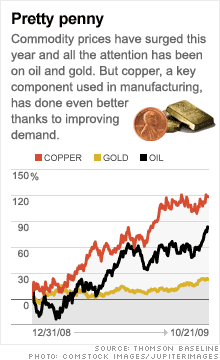The one market you can't ignore is ...
Copper. Yes, gold and oil are getting all the attention in the commodity bull run. But copper prices are surging, too -- and that's actually a good economic sign.


NEW YORK (CNNMoney.com) -- There have been so many market milestones making headlines lately that it's getting hard to keep track of them all.
The Dow has leapt past 10,000. The S&P 500 is nearing 1,100. Oil's above $80. Gold has surged over $1,000. The euro cracked $1.50 against the dollar.
But there's another asset that just crossed a significant level as well. And even though the number isn't very high, it might be the best news for all the bulls out there that think the economy is on the mend.
Copper prices closed above $3 a pound on Wednesday for the first time since September 2008. That is very important. Here's why.
The price of copper, more so than the prices of oil and gold, appears to be heading higher primarily because of increased demand for the metal. And that is important because copper is a key component for major manufacturing and industrial companies -- the metal is used in wiring for telecommunications networks, pipes for plumbing and appliances, automobiles and computers, for example.
That makes it arguably one of the most important commodities to watch if you are interested in determining whether businesses around the world are actually looking to ramp up production of goods. Some economists and traders even jokingly refer to the metal by the nickname of "Dr. Copper" because of its ability to predict macroeconomic trends.
Now some skeptics have been dismissing the skyrocketing prices of copper and other commodities as the byproduct of mere speculation. Momentum traders may be simply following the trend and bidding up the prices of commodities regardless of whether demand justifies these prices.
In addition, there's the weak dollar play going on as well.
One reason the dollar is sinking is because of concerns about the massive amount of money the federal government is spending on stimulus and bailouts. That's led to inflation fears that have helped pushed gold, which is often viewed as an inflation hedge, higher.
Finally, oil is priced in dollars, so it benefits as the greenback continues to lose ground against the euro and other currencies.
These factors, of course, influence the price of copper as well.
"Copper has doubled in about six months. It's hard to say things have really improved in the economy that much. In the past few weeks, copper has moved in line with the dollar," said Edward Meir, senior commodity analyst at MF Global, a commodity brokerage firm based in New York
A supply disruption caused by mechanical problems at BHP Billiton's (BHP) Olympic Dam in Australia earlier this month have also lifted prices. (Olympic Dam is the fourth-largest copper deposit in the world.)
But copper has also been helped by signs of real demand starting to pick up.
"In the past week, copper and other commodities such as wheat and corn has been given a lift by the weak dollar. But you also have real things driving copper upward," said Patricia Mohr, a vice president of economics and commodity markets specialist Scotia Capital in Toronto.
Freeport-McMoran Copper & Gold (FCX, Fortune 500), one of the world's largest copper miners, reported much better than expected sales and profits for the third quarter Wednesday.
But more importantly, Freeport-McMoran CEO Richard Adkerson told investors during a conference call that the company was taking steps to restart copper production at an idled mine in Arizona and that it was looking to invest in some projects next year that had been deferred due to the recession.
This is encouraging. As I've expressed repeatedly in this column over the past few months, the strength of an economic recovery is going to be largely based on how quickly companies are able to ramp up production and start hiring again.
If jobs come back, that could go a long way towards jump starting consumer spending and ending the foreclosure crisis that is still weighing on the housing market.
To be sure, Freeport's Adkerson went out of his way during the conference call to say that the company was not seeing a big pickup in demand just yet -- especially from the U.S. or Europe. But there are other big markets where demand may be on the upswing.
China, unsurprisingly, is one such market. China imports a lot of copper, primarily for building infrastructure. So the fact that China reported Thursday that its gross domestic product rose 8.9% in the third quarter has to be considered a bullish sign for copper.
"In the first eight months of this year, copper imports into China were at all-time record highs. It's a bigger consumer now than the U.S.," Mohr said. "China's economy has rebounded so nicely that they've had to restock copper supplies to underpin their growth."
Still, MF Global's Meir pointed out that there will need to be more demand for copper in the U.S. to justify further price increases. He said there is little evidence of that at this point.
But even though demand for copper in the U.S. remain sluggish for now, Mohr said there are some signs that car manufacturers may need more copper as they push to make more fuel-efficient vehicles that became increasingly popular in light of the government's Cash for Clunkers program.
"The pickup in automotive production has been quite pronounced and probably will be sustained until the early part of 2010," Mohr said. "A couple of years from now, I expect copper to move over $4. The global economy has largely pulled out of recession."
That may all add up to a much healthier prognosis for the global economy from Dr. Copper than anyone would have thought just a few months ago.
Talkback: Will commodity prices keep rising? Are you buying gold and oil instead of stocks? Share your comments below. ![]()

